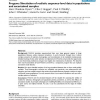19 search results - page 1 / 4 » The Role of Population Size in Rate of Evolution in Genetic ... |
EUROGP
2009
Springer
13 years 11 months ago
2009
Springer
Abstract. Population size is a critical parameter that affects the performance of an Evolutionary Computation model. A variable population size scheme is considered potentially be...
GECCO
2004
Springer
13 years 10 months ago
2004
Springer
In this paper we examine the effects of single node mutations on trees evolved via genetic programming. The results show that neutral mutations are less likely for nodes nearer th...
ICGA
1993
13 years 5 months ago
1993
It is part of the traditional lore of genetic algorithms that low mutation rates lead to efficient search of the solution space, while high mutation rates result in diffusion of s...
GECCO
2008
Springer
13 years 5 months ago
2008
Springer
Hereditary Repulsion (HR) is a selection method coupled with a fitness constraint that substantially improves the performance and consistency of evolutionary algorithms. This als...
BMCBI
2008
13 years 4 months ago
2008
Background: FREGENE simulates sequence-level data over large genomic regions in large populations. Because, unlike coalescent simulators, it works forwards through time, it allows...

